#Brundisium
Explore tagged Tumblr posts
Photo
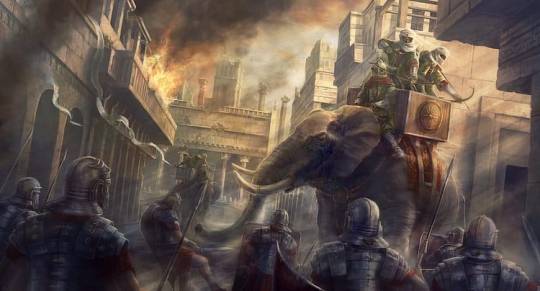
Second Punic War
The Second Punic War (The Hannibalic War) was fought between Carthage and Rome between 218 and 201 BCE. The war involved confrontations in Spain, Italy, Sicily, Sardinia, and North Africa. Hannibal led the Carthaginians, one of the most gifted commanders in history, but the Romans had their own great general Scipio Africanus, and he successfully attacked Carthage on home soil.
Learn more about Second Punic War
57 notes
·
View notes
Text
C4
Thoughtless service. Can there be a more virtuous calling? Every appetite screams otherwise.
Since arriving at Brundisium with the morbidly obese corpse of my former Master, Ho-Hak Bar-Hom, I’ve done all I can to serve without a thought about my ultimate fate. Yet recent events have wonder about the subject leaking in. And like air into a broken cork of a Ka-la-na bottle, it threatens to sour me.
I was sent to serve the city, served in the Inn, then was directed to serve in the Tavern, and now hear that I’ll be rented to the Tavern officially. These are just subtle waves moving me in new directions, but they have me wondering about whether I’ll one day wind up privately owned again. Wondering what comes with wondering what manner of Master will own me.
“Own” is only a three-letter word, but it is immense. It defines the world of a girl. It determines what I do, wear, eat, say and believe. It calculates the ratio of my bruises and caresses. It is more my name than my name itself.
And so who will define that word? That question leads to a dangerous place, desire. If one is to believe that there is a difference between good and bad, right and wrong, how can one not desire a good Master? And how can one not then wonder what good and bad mean?
Such thoughts lead me to reflect on my service here and to the belief that I’ve served some bad Masters. I’ve served impatient Masters and I’ve served contradictory Masters. I’ve served the elusive, the fawning and the sadistic. I’ve even served the perverse, who asked me to do things that were, arguably, against nature and the Priest Kings.
And such thoughts lead me to see many good Masters, Masters whose qualities call to me like wind calls to flame. There are clever Masters here, who play games with my body and treat my mind to deeper truths. There are commanding Masters, inventive Masters and passionate Masters. I’ve knelt to Men of ambition, in whose eyes reside a thousand and one entertainments, whole futures as wide and generous as the Thassa.
Yet such thoughts are poison, are they not? Like Kanda smoke, they thrill the mind at the expense of the body and soul. They are addictive and deadly.
I believe this because I know fate well, and I know it to be fickle. It raises one up to pleasure and security, only to rip both away. It is the engine of all appetites. The more one is fulfilled, the more one craves, and the greater the pain and anguish when the craving goes unsatisfied.
This is the same for the kajira as it is for the warrior. Don’t generals, in their triumphs at Ar, ride their victory parade chariots with a slave whispering into their ear, over and over, that all glory is fleeting? One rises high, only to be cast down, betrayed by allies or by the most treacherous ally of all, age.
The only peace to be found is the peace within oneself that exhales and in doing so releases one from the fetters of desire. Only by abandoning what could be will we find satisfaction in what is. Only by giving up everything can we receive the world.
This is the way of the slave. A slave must make an instrument of her desire, and play it well. She must not be played by it. Otherwise, she comes to feel the lash of the fact that fate makes slaves of us all.
2 notes
·
View notes
Text
i think it's really nice that ursula le guin was careful to specifically mention in lavinia that vergil isn't so much a real historical person as a character we've all constructed in our collective imagination. because now she's also a character we've all constructed in our collective imaginations.
#that reference the vergil makes-- ostensibly as he lies dying in brundisium in 19 bce-- to meeting dante in the wood kills me#he's dante's vergil and wilder's vergil and broch's vergil and le guin's vergil and mine#which i suppose means he's not his own. as lavinia is not her own. that's what it means to live on in memory.#its just me and the ursula k le guin in my head and the vergil in her head in my head and the aeneas in his head in her head in my head...#mine#aeneidblogging
314 notes
·
View notes
Text
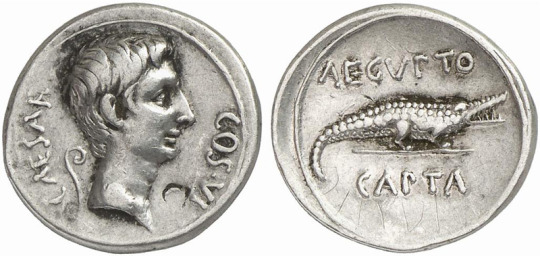
Silver denarius minted at Rome or Brundisium between 29 and 27 BCE by Julius Caesar's adopted son Octavian, soon to become Augustus. The denarius celebrates Octavian's conquest of Egypt following his (or, rather, Marcus Agrippa's) naval victory over Antony and Cleopatra at Actium. On the obverse, the bust of the young Octavian, with a lituus (ritual staff) showing his membership in the college of augurs; on the reverse, a crocodile surrounded by the inscription AEGYPTO CAPTA ("Egypt [having been] captured"). Beneath the inscription is a graffito from an unknown source. Photo credit: Classical Numismatic Group, Inc. http://www.cngcoins.com
#classics#tagamemnon#ancient history#Ancient Rome#Roman Empire#Roman history#Octavian#Augustus Caesar#Emperor Augustus#art#art history#ancient art#Roman art#Ancient Roman art#Roman Imperial art#coins#ancient coins#Roman coins#Ancient Roman coins#denarius#numismatics#ancient numismatics#metalwork#silver#silverwork
370 notes
·
View notes
Text

Omega Radio for August 2, 2014; #57.
Neu! “Hallogallo”
Captain Beefheart “The Host The Ghost The Most Holy-O”
Jonathan Richman & The Modern Lovers “Dodge Veg-O-Matic”
Death “Where Do We Go From Here?”
Destroy All Monsters “What Do I Get?”
Cramps, The “Hypno Sex-Ray”
Saints “Wild About You”
Stiff Little Fingers “No More Of That”
Minutemen, The “Bob Dylan Wrote Propaganda Songs”
Husker Du “New Day Rising”
Swans “Money Is Flesh” (live)
Henry’s Dress “You’re My Radio One”
Late! “Color Pictures Of A Marigold”
Meat Puppets, The “Plateau”
Beatings, The “Stockholm Syndrome Relapse”
Kurt Vile “So Outta Reach”
Boom Boom Box, The “Holiday”
Paint Fumes “Space Cadet”
Mark Feehan “See You In Brundisium”
Purling Hiss “Purple Hiss”
Jesu “Comforter”
Godflesh “Decline And Fall”
Marching Teeth “Sun God”
Cutthroats 9 “Induction”
Deluxe broadcast; all guitars.
#omega#music#playlists#mixtapes#noise rock#doom#garage#alternative#punk#Captain Beefheart#Destroy All Monsters#Cramps#Stiff Little Fingers#Husker Du#Swans#Meat Puppets#Kurt Vile#Harry pussy#Purling Hiss#Jesu#Godflesh#Cuttroats 9
5 notes
·
View notes
Text

Benjamin West, 1738-1820
Agrippina landing at Brundisium with the Ashes of Germanicu, 1768, oil on canvas, 163.8x240 cm
Yale University Art Gallery, Inv. 1947.16
This painting exemplifies a reawakened interest in the noble values of classical antiquity—stoicism, self-sacrifice, generosity, patriotism—that influenced artists and writers as well as politicians in the second half of the eighteenth century. It brought the Pennsylvania-born Benjamin West, who was working in London, immediate praise and the patronage of King George III. West here depicts a dramatic episode from Roman history. Agrippina, widow of the assassinated and much-admired general Germanicus, is seen arriving with the ashes of her slain husband. (Yale)
27 notes
·
View notes
Text
BATTLE OF FORUM GALLORUM, APRIL 14TH 43 BC
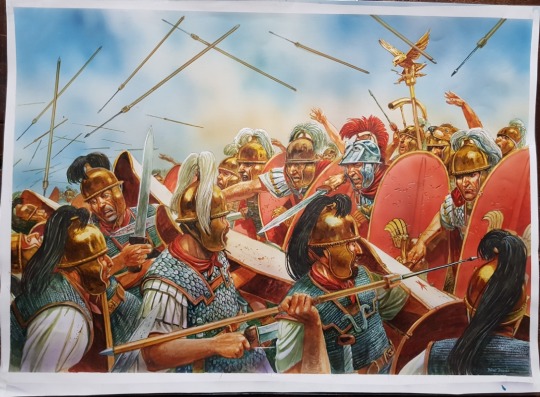
This battle was fought between the forces of Marcus Antonius and legions loyal to the Roman senate under the overall command of the consuls Vibius Pansa aided by his fellow consul Aulus Hirtius while Octavian remained behind at senate's camp.
After leaving a part of his forces under the command of his brother Lucius Antonius to hold Decimus Brutus in siege and engage Hirtius and Octavian with a feigned attack on their camp, Antony secretly marched off from his camp with the Second Gallica (Legio II Gallica) and Thirty-Fifth Legions (Legio XXXV) and his praetorian cohorts, and those of Marcus Junius Silanus along the Via Aemilia over the marshy ground to halt Pansa’s progress. Antony’s ambush attack in a forest and marsh near Forum Gallorum was masterly. Antony himself led the center. But his move was discovered and the Martian legion led by Carsuleius and Servius Sulpicius Galba (one of Caesar's killers) and Octavian’s praetorian cohorts were dispatched to meet and reinforce Pansa, with the result that when Antony made his attack, he found himself fighting not only the newly recruited legions but also this legion of veteran soldiers who were thirsting for revenge upon him for the executions at Brundisium.

According to Appian, “there was a suspicious agitation of the bushes, then a gleaming of shields and helmets, and Antony's praetorian cohort suddenly showed itself directly in their front. The other troops divided themselves in two parts and advanced into the marsh on either side, the one commanded by Pansa and the other by Decimus Carsuleius. While the praetorians of Octavius confronted the praetorians of Antony. Thus, there were two battles in two marshes, and neither division could see the other by reason of the elevated road, while along the road itself the praetorian cohorts fought another battle of their own. The Antonians were determined to punish the Martians for desertion as being traitors to themselves and allying with the senate. The Martians were equally determined to punish the Antonians for condoning the slaughter of their comrades at Brundisium. Recognizing in each other the flower of either army they hoped to decide the whole war by this single engagement. Being veterans, they raised no battle-cry, since they could not expect to terrify each other, nor in the engagement did they utter a sound, either as victors or vanquished. As there could be neither flanking nor charging in marshes and ditches, they stood together in close order, and since neither could dislodge the other, they locked together with their swords as in a wrestling match. No blow missed its mark. There were wounds and slaughter but no cries, only groans; and when one fell, he was instantly borne away, and another took his place. They needed neither admonition nor encouragement, since experience had made each one his own general. When they were overcome by fatigue, they drew apart from each other for a brief space to take breath, as in gymnastic games, and then rushed again to the encounter.”
In this fierce and bloody battle, Carsuleius had fallen mortally wounded and the Martians began to fall back while still repulsing Antony’s cavalry assaults.
Finally, the Martian legion were routed with Antony’s praetorian cohorts completely destroying Octavian praetorian cohorts to the last man. In the marshes to the left of the Via Aemilia, Pansa suffered a serious injury; his wound said to have come from an enemy javelin. This shook the morals of cohorts of the Martians. While the injured consul was transferred to Bononia, the Antonian veterans of Second Gallica put the cohorts to flight. When the new recruits of Pansa saw this, they fled in terror, disorder and with loud cries towards their camp. Antony fell upon these veterans and new recruits, making a great slaughter.
While Antony’s troops celebrated, collected booty of victory and singing hymns of victory, Antony soon realized that Hirtius’ fresh troops were approaching towards them from the north. Antony could waste no time on pursuing Pansa's broken army and began marching his disorderly troops back towards Mutina.
Antony hurriedly got his troops in line and bravely faced the enemy forces. Despite their tough resistance and instances of great valour, greater part of them were slain in this encounter, although Hirtius could not pursue them. As darkness was coming, he allowed them to escape in fear of being lured into a trap. A wide stretch of the marsh was filled with arms, corpses of men and horses, wounded men, and half-dead men. Some were unhurt but were overcome by fatigue. Antony and his cavalry, as many as he had with him, went to their assistance and collected them throughout the entire night. Some they put on horse-back in their own places, others they urged to take hold of the horses' tails and run along with them and so secure their safety. Antony then encamped without entrenchments in a village nearby, called Forum Gallorum (Castel Franco).
Thus, the long and bloody battle of Forum Gallorum came to an end.
Sources: Plutarch’s Life of Antony
Cicero, Philippics
Appian, The Civil Wars III. 66-70
Eleanor Goltz Huzar, Mark Antony – A Biography
Ronald Syme, The Roman Revolution
#mark antony#marc antony#marcus antonius#octavian#rome#mutina#roman history#ancient rome#roman republic#roman empire#battle of forum gallorum#on this day#ancient history#history
11 notes
·
View notes
Text
Nitimur in Vetitum
chapter fourteen: ligatus (bound)

9th Day Before the Kalends of Iulius (23rd June)
Lucretia let out a loud huff as she leant back against Agrippa. The messenger that had just arrived from Brundisium was stumbling over his words as he relayed the message that Antonius had sent to Gaius. For the past three months the two Triumvirs had been sending messages back and forth, on some odd attempt to avoid a war.
Why they couldn't just come to terms over this petty conflict, Lucretia didn't understand. This back and forth did nothing but weaken them both in the eyes of Rome. It was foolish and it made her blood boil. "Gods this is foolish," Lucretia snapped. Her annoyance with the stuttering fool of a messenger finally boiling over. "Just settle this now Gaius"
"I'll look weak if I give in first," Gaius glared at her.
"You look weak now," Lucretia snapped. She stood quickly, striding across the room to stand before her brother. "You look like a foolish child who cannot solve a petty disagreement with your ally."
"If he looks foolish then Antonius will too," Agippa said from behind her.
"Yes," Lucretia agreed, she took a few more steps forward to lean against the table. "But Gaius has only been active in Rome's politics for four years, he has begun to establish himself but is still seen as young and inexperienced. His inability to handle this disagreement reflects worse on him than it does on a seasoned general and politician."
Gaius gritted his teeth. Lucretia could see his thoughts running through his head as he tried to find a flaw in her argument. "I have been nothing cordial, offering actual solutions to this issue. It is Antonius who is being obstinate," Gaius finally said.
Lucretia raised a brow. "Antonius is being obstinate," she repeated. Lucretia tapped her hands against the wood of the table. "I shall go and speak with Antonius," she declared.
"No!" Gaius and Agrippa almost yelled as one. Lucretia glared sideways at them. Then, noticing that the messenger was still standing near the door, she waved him out.
"I have known Antonius since I was a child, he would not harm me," Lucretia said. "Besides, to cause me harm could cause a war of blood instead of papyrus."
Agrippa let out a noise of complaint but Gaius was staring at her with narrowed eyes. "You truly believe that?"
"I do," she gave a decisive nod.
Gaius swallowed. "You cannot actually be considering this?" Agrippa snapped.
"She's right," Gaius said softly. "We need to solve this now and she is the only person who Antonius may speak to."
"You have to be fucking joking," Agrippa hissed lowly. "I will not let my wife risk-"
"-I am going," Lucretia cut him off. "And that is final." She snapped turning to one of the slaves near the edge of the room. "Gather my things I shall leave at once."
--
5th Day Before the Ides of Iulius (11th July)
The city of Brundisium was beautiful. Lucretai had seen quite a few cities in Italia throughout her life, travelling with her mother when she was young and her father after her mother passed, but she had never seen Brundisium. It was not nearly as large as Rome but bigger than Ardea was.
Antonius had set up an encampment on the outside of the city but himself was living in the house of some ally inside the walls.
Lucretia had not expected to be instantly invited inside after her arrival, but it seemed some scout must have seen her coming because there were already men waiting to escort her to Antonius when he reached the city gate.
They led her through a few small streets and to a large villa. Antonius was waiting inside for her. Seated on a klinai, reading a letter. "Lucretia Julia!" He called with a smile that did not reach his eyes when she entered the room.
"Marcus Antonius," Lucretia responded with her own fake smile.
"To what do I owe this visit?" Antonius asked.
"My brother sent me," Lucretia said bluntly as she took a seat on the klinai opposite him. "He wishes to finally resolve this petty disagreement."
"Petty disagreement..." Antonius repeated. "He fought my wife."
"Your wife attacked us," Lucretia raised her brow. "And when the war was over both her and your brother were pardoned for their uprising. It was you who sent her away." Lucretia paused, "I hear she recently passed, I am sorry for your loss." She added.
Antonius clicked his tongue, "thank you." There was a moment of silence. "What does your brother want?"
"All he asks is that his occupation of Gaul be recognised as a legitimate action, and that he gain control of Illyricum. In return he will confirm your control of the east and support any military actions you wish to take there," Lucretia told him the terms that she and Gaius had discussed before she left.
Antonius stared at her with narrowed eyes for a moment. "Italia remains neutral."
"Of course," Lucretia nodded.
Her father's old friend clicked his tongue again. "I will agree on the condition that Gaius comes to an agreement with Sextus Pompeius too."
"He already has plans for one," Lucretia nodded.
"Then I am amiable to these terms," Antonius nodded.
"There is one more thing," Lucretia leant forward. "Due to the recent death of your wife... my brother is willing to offer you a marriage to seal this peace."
"A marriage? With who?" Antonius raised a brow.
"Octavia. She is a widow and not currently pregnant."
"From my knowledge she has not yet completed her mourning period. Nor have I," Antonius said.
That was true, she was not even halfway through it but she was the only female member of the family through which this peace could be sealed. "The pontiffs would be willing to offer an exception."
Antonius tapped his fingers against the side of the klinai. "I would be honoured to marry Gaius' sister."
--
6th Day Before the Kalends of Sextilis (27th July)
Lucretia pushed off the wall she had been leaning on to watch the builders when Scribonia entered the room. "Get Octavia," she ordered one of the slaves standing beside her.
Scribonia turned to look at her. "Hello Lucretia," she greeted.
"Hello Scribonia," Lucretia smiled. She walked over to hug the other woman in greeting.
Footsteps came from behind them and the two women turned to see Octavia walking towards them with her two youngest children. "Uh Octavia!" Scribonia called. "The Gods. Give me one of those." She reached for one of the children. A slave was following behind Octavia with Fabia in her arms and Lucretia reached out to take her daughter as well.
"Take Marcellus. He's such a lump," Octavia held her son out for Scribonia to take. "I can mange Marcellina," Octavia fixed the cloth wrapped around her youngest.
Fabia grabbed Lucretia's hair and she had to push the little one's hand away. Replacing her hair with the gems around her neck in her daughter's hand. The three women began to slowly walk out of the atrium. "Wow. How much did this cost?" Scribonia asked.
"Our brother came into some money, as you know," Lucretia explained.
"Excuse the mess. Gaius has only just got back to Rome from signing the agreement with Antonius," Octavia moved her hand in the direction of the builders.
"He's too busy to bully the builders so we offered to help," Lucretia joked.
"It helps take my mind off everything," Octavia said softly. "Do you like it?" She suddenly asked Scribonia, looking up at her.
"I...I do," Scribonia laughed slightly.
"That's good," Octavia locked eyes with Lucretia for a moment. "Because you'll be living here soon." Scribonia furrowed her brows slightly. "Our brother's proposing a marriage to you as part of the treaty with Sextus."
Scribonia's eyes widened in shock and joy. Lucretia felt her stomach turn. Marcellina began to cry. Octavia smiled down at her and then began to walk over to one of the seats against a wall behind them. Lucretia followed her.
Scribonia let out a slight laugh again as she placed Marcellus down and turned to face them. "I told you you'd find my family useful," she smiled.
"Of course, negotiations are bound to drag on for months," Octavia said as she pulled one of her sleeves off to feed Marcella.
"That's what Gaius says anyway," Lucretia added.
Octavia looked down at her feeding daughter, face filled with emotion. "What?" Scribonia asked. "Aren't you happy for me?" Lucretia almost rolled her eyes at the oblivious selfishness of the woman, Octavia was obviously upset.
"Yes," Octavia looked at her. "Yes. But I am to marry Marcus Antonius to seal the peace between him and my brother," she revealed. "The latest one anyway."
"You're not even halfway through your mourning period," Scribonia said, her voice a mix of shock and care.
"I could hardly say no to Gaius," Octavia looked sideways at Lucretia who blinked and looked away.
--
On the Ides of Sextilis (13th August)
Lucretia shifted her dress slightly as more people entered the villa. Even Antonius would be here today, and Lucretia caught sight of him pushing his way to the front of the crowd. Gaius was already standing to the left of her, with Agrippa at his side. Her brother caught her eyes and gave a small smile, Lucretia responding with her own tight one.
There was the sound of movement behind her and Lucretia glanced up to see Scribonia and her father, Lucius Scribonius Libo, walking down the stairs. Lucretia raised her hands to politely clap as Scribonia reached the bottom of the stairs. She had to admit that the woman looked beautiful in her white and yellow dress.
Agrippa stepped forward to stand closer to the dais where Lucretia was waiting. "Welcome, to the marriage of Gaius Julius Caesar Octavianus and Scribonia Liba," Agrippa began. The two named people came closer together to stand beside Lucretia. She looked forward when she saw some men leading forward a goat for the sacrifice. "Great Juno, Goddess of Marriage and Fertility, accept this gift of life and blood from this great house of Lucius Scribonius Libo." Agrippa halted to let the sacrifice take place.
"Scribonia Liba, are you ready?" He asked the woman.
"Yes," Scribonia said softly.
"Gaius Julius Caesar Octavianus, do you agree?"
"I do," Gaius' voice was strong.
"Then she is yours," Agrippa nodded.
Lucretia held out her hands and placed Gaius and Scribonia's together in front if her. Cheers and clapping broke out amongst the watching crowd and Lucretia smiled tightly at the newly married couple. --
On the Nones of September (5th September)
Lucretia did not know whether she preferred to be watching or participating in this wedding. Maybe it was the fact that Lucius and his wife were the ones officiating that made her displeased. She may have recommended that they pardon the man but that did not make her like him anymore.
Lucretia had to contain a scoff when Scribonia started playing with the ends of her sleeves. Even a month into their marriage Scribonia was still clinging to Gaius like he would disappear and it made Lucretia's skin crawl.
Her thoughts were derailed by Octavia and Gaius entering the room. Octavia was gorgeous, she always had been. She was wearing a slightly darker white than other brides often did. Even though she had received a dispensation to marry it did not make her mourning for her late husband any less potent.
Lucius began the ceremony with a smile, and Lucretia let her thoughts wander again as she gazed around at the guests. Many were people she knew but were not close with. Horatia was here, with Lucius Fabius, and she caught her eye and gave a small smile. Agrippa placed a hand on Lucretia's back to bring her back to the present just as Antonius said the words that would confirm the marriage. She began to clap with the others, glancing sideways Lucretia locked eyes with Gaius who gave her a small triumphant smile.
Their peace with Antonius was sealed and soon the negotiations with Sextus would come to an end. Peace would rule Rome.
NiV masterlist / post masterlist
#fanfic#domina mgm+#domina2021#augustus#ancient rome#marcus agrippa#octavia#marcus antonius#scribonia
3 notes
·
View notes
Text
oh this fucking medea chapter. I just had to rearrange its guts because I forgot to set up sulla & co landing in brundisium and that's essential for how that chapter ends and the next one starts. this is the third major set of edits I've made to it. there's one page here that's basically been covered up with sticky notes because the original stuff became unusable once I made the first round of revisions. I did figure out that the pacing problem with the voyeurism bullshit could be fixed by placing it a scene and a half back from where I had originally written it. so. we stay winning. I think.
#the shaving scene stays in tho. im not taking that out.#especially because it's calamus' character moment. it STAYS#extremely excited for the next chapter tho. its politics its schemes its manipulation we LOVE it
4 notes
·
View notes
Text
I…what? Did they abscond with it? Conspire about it? Insist on not stopping at the grocery store for snacks? Was there a Cheese Heist on the road to Brundisium? Why are we asking Virgil and Varro where the cheese is?? WHAT DO THEY KNOW THAT HORACE DOESN’T???
(edit I found the paper on @jstor and it’s actually really interesting but I prefer my mental images of cheese shenanigans on the via appia helppppp)

finally someone asks the questions that matter
#and where is maecenas in this tale of intrigue#quintus horatius flaccus#publius vergilius maro#roman shitposting#tagamemnon
1K notes
·
View notes
Text
The Last Years of Julius Caesar’s Life in Five Coins

Written by Sebastian L. Harris
Gaius Julius Caesar (100-44 BCE) is considered one of history’s greatest generals and statesmen, who famously defeated the Germanic king Vercingetorix during the Gallic Wars (58-50 BCE) and his former ally Pompey during the Civil War (49-45 BCE). However, he might also be described as one of the best self-promoters, as seen through his and the Caesarians’ coins. Coinage provides a wealth of knowledge on the history and motivations behind the individuals who minted or authorised them, so let us examine a sample of five coins from the final years of Julius Caesar’s life.
CIVIL WAR. After Julius Caesar crossed the Rubicon in 49 BCE (both literally and figuratively), his ally-turned-enemy and senatorial champion, Gnaeus Pompeius Magnus, fled from Brundisium to the East, leaving Rome and the Roman Senate exposed, both of which offered little opposition. While fighting Pompey over the next two years, he established a moving mint where he minted the first coinage to bear his name. The denarius (RRC 443/1) depicts symbols of the pontifex maximus (“chief high priest”) on the obverse, a position he used to emphasise his connection with the gods. The reverse represents the perpetua discordia between elephants and snakes, where a cornered snake (Caesar) will triumph over the larger elephant (Pompey). SPOILER: Caesar did win and was given his most prominent title as a result.
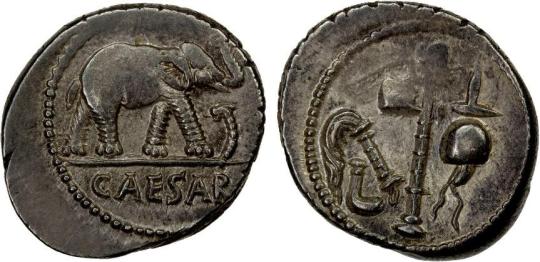
Silver Denarius of C. Julius Caesar (49 BCE) [RRC 443/1]
DICTATOR. Although declared dictator (traditional Republican magistrate) for eleven days in early 48 BCE, he was later named dictator for one year, then ten further years after successfully ending the Civil War that year. During his time as dictator (48-44 BCE), he changed the number of magistracies and reformed the state, minting a coin portraying himself as dictator for the first time, an aureus in 47 BCE (RRC 456/1). It depicts an axe, culullus (ritual vessel), jug and lituus (military trumpet), all symbols of the pontifex maximus, and the legend DICT ITER (“Dictator for the second time”). While he also held other positions (consul, augur, pontifex maximus) [RRC 467/1], he advertised his dictator position most frequently on coins (17 times). There is, however, a more peculiar title he gave himself.
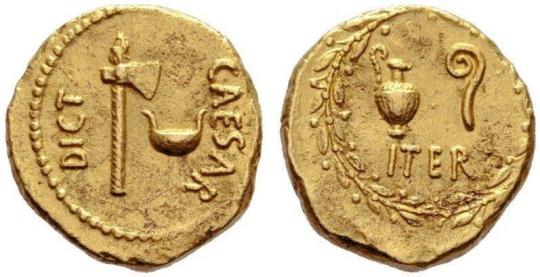
Gold Aureus of C. Julius Caesar (47 BCE) [RRC 456/1]
MORALS. In 46 BCE, Julius Caesar established a new office that was very similar to the censors'. This office was known as prefect of the morals. He added this position so he could wield the censorial powers and not be constrained by limitations, using this prefecture to fill the Senate with his own faction and minimise opposition. Although minted by the moneyer Publius Sepullius Macer after Caesar’s death in 44 BCE (RRC 480/21), the denarius depicts the image of Caesar as moralistic. The coin features a tetrastyle temple with the legend CLEMENTIAE CAESARIS (“Caesar the Clement”) on the obverse, with a desultor (skilled horsemen who lept from one horse or chariot to another) and moneyer’s name on the reverse (a reference to Caesar’s Games at the Parilia). He does, however, go from being moral to being authoritarian in two years.
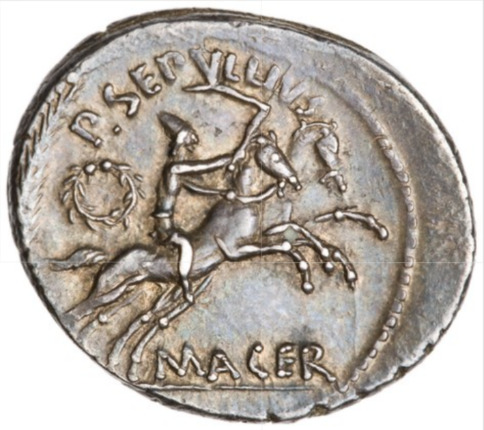
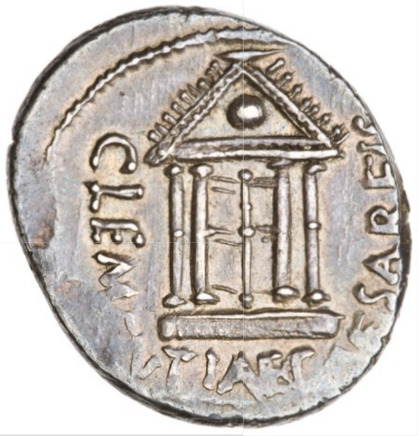
Silver Denarius of P. Sepullius Macer (44 BCE) [RRC 480/21]
PERPETUO. Dictator is a word with a negative connotation, as someone who has complete and absolute power, and we can trace this use back to when Julius Caesar was named dictator perpetuo (“dictator for life”) in 44 BCE. He chose every representative in Rome, strengthening his support, so it is no surprise most coins minted in 44 BCE are pro-Caesar, including a range of silver denarii with the DICT·PERPETVO legend by the same Macer above. This coin (RRC 480/10) depicts the wreathed head of Caesar, matched by Venus (holding Victory, sceptre and shield) on the reverse; Venus being the mythical ancestor of the Julii (see RRC 458/1). It would, however, only be a matter of time before Caesar would be ‘stabbed in the back.’
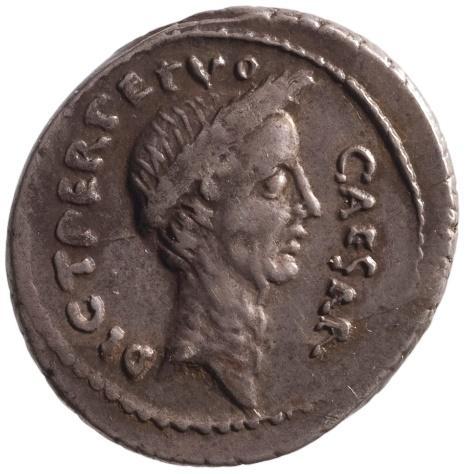
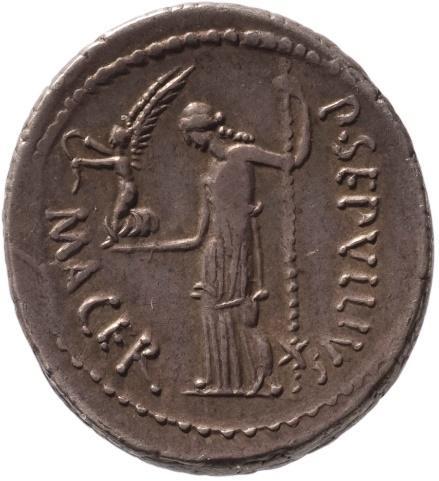
Silver Denarius of P. Sepullius Macer (47 BCE) [RRC 480/10]
EID OF MAR. A day marked by several religious observations and notable as a deadline for settling debts (ironically), March 15th has become synonymous with Julius Caesar’s assassination. Ignoring a warning by the seer Spurinna to “beware the Ides of March,” Caesar entered the Curia of Pompey and was stabbed 23 times by 60 senators, led by Marcus Junius Brutus and Gaius Cassius Longinus. To celebrate the death of Caesar, the conspirator Brutus authorised the moneyer L. Plaetorius Cestianus to mint a denarius in 43 BCE (RRC 508/3). The coin depicts the head of Brutus, and the reverse features a pileus (“cap of freedom”) between two daggers with the legend EID MAR. As to whether killing Caesar benefitted Rome or not is still debated, but arguably it was crucial for Rome’s development as an Empire.

Silver Denarius of L. Plaetorius Cestianus (43 BCE) [RRC 508/3]
Coins are sometimes the overlooked keys that are crucial to understanding history. These artefacts support the narrative presented in written sources (both ancient and modern), and it is through these coins that we can see the changing “face” of Caesar. We see what he stood for and how he effectively used his titles and honours to promote himself to Roman society. As to whether he was the good stateman or bad tyrant in the last years of his life, I will leave that up to you to decide.
80 notes
·
View notes
Text
Book Blitz: The Subtle Lines of Truth
Rerum Initium Historical Novel, Metaphysical Date Published: July 29, 2024 Voyage through the serene Mediterranean as two souls unravel the enigma of ancient wisdom lost to the ages. In the year 64 AD, two men embark on a fateful voyage from Corinth to Brundisium, destined for the ancient city of Herculaneum. As their boat cuts through the calm Mediterranean Sea, their conversations…
0 notes
Text
The Subtle Lines of Truth
Rerum Initium Historical Novel, MetaphysicalDate Published: July 29, 2024 Voyage through the serene Mediterranean as two souls unravel the enigma of ancient wisdom lost to the ages. In the year 64 AD, two men embark on a fateful voyage from Corinth to Brundisium, destined for the ancient city of Herculaneum. As their boat cuts through the calm Mediterranean Sea, their conversations…

View On WordPress
0 notes
Text
Augie March - Brundisium [indie rock/folk] (2002)
Augie March - Brundisium [indie rock/folk] (2002) https://www.youtube.com/watch?v=l-RH4UA5VDU Submitted May 09, 2024 at 12:42AM by torn-ainbow https://ift.tt/RezsUGF via /r/Music
0 notes
Text
The great mother of the gods (1901) (14777925241).jpg

Identifier: greatmotherofgo00show (find matches) Title: The great mother of the gods Year: 1901 (1900s) Authors: Showerman, Grant, 1870-1935 Subjects: Cybele (Goddess)Mythology, Classical Publisher: Madison Contributing Library: Robarts - University of Toronto Digitizing Sponsor: University of Toronto
View Book Page: Book Viewer About This Book: Catalog Entry View All Images: All Images From Book Click here to view book onlineto see this illustration in context in a browseable online version of this book.
Text Appearing Before Image: The ministers of ordinary rank were sometimes men, sometimes women, the former being the castrated Galli.. Their garb was similar to that of the high priest and high priestess—garments of various bright colors, necklaces, im- ages, etc. 1 The occabus, defined by Hesychius as ra rrepl rovppaxtova if eWta, and the corona, a golden crown with medal- lions, were sometimes presented by the quindecimviri. 2 There were sacerdotes primi3and sacerdotes secundo loco4and consacerdotes. 5 A priest at Ostia was minister of both the Great Mother and Isis, and one at Brundisium of these tw oand Dea Syria.6 There is little evidence as to the period of service. A priest at Lugdunum has perpetuitatem sacer- doiii bestowed upon him by decree of the ordo Lugdunensis. 7 Among the official servants of the Mother were the tibi- ———————————————— 99 Ibid. VI 502, 2257. 100 Visconti Museo Pio-Clem. VII p. 104. 1 Dionys. Hal. II 19; Ovid Fast. IV 339. 2 C. I. L. X 3698; XIII1751. 3 Ibid. IX 1541. 4 Ibid. 1538, 1541. 5 Ibid. 1540. 6 Ibid. XIV 429; IX 6099. 7 Ibid. XIII 1751. BULL. UNIV. WIS., PHIL. AND LIT. SER. VOL. 1, PL. 2. Text Appearing After Image:
A PRIESTESS OF THE GREAT MOTHER. From a Relief in the Vatican. (After Baumeister.) SHOWERMAN THE GREAT MOTHER. 275
0 notes
Text

Joseph Mallord William Turner, 1775-1851
Ancient Rome; Agrippina landing with the ashes of Germanicus, exhibited 1839, oil on canvas, 91.4x121.9 cm
Tate Gallery, Inv. N00523
The story of Agrippina was popular with history painters as an example of love and devotion. Agrippina was married to Germanicus, a Roman general. He was both the nephew and adopted son of the Roman Emperor, Tiberius. Germanicus died in the city of Antioch, killed by either poison or magic. Agrippina carried his ashes back to Rome in an urn. Turner paints the city in great detail, although Agrippina landed at Brundisium (now Brindisi) rather than Rome. In 1839 Turner exhibited this painting with a view of modern Rome. (Tate)
4 notes
·
View notes